- Home
- Vicki Delany
The Cat of the Baskervilles
The Cat of the Baskervilles Read online
Also Available by Vicki Delany
Sherlock Holmes Bookshop Mystery
Body on Baker Street
Elementary, She Read
Year Round Christmas Mysteries
Hark the Herald Angels Slay
We Wish You a Murderous Christmas
Rest Ye Murdered Gentlemen
Lighthouse Library Mysteries (writing as Eva Gates)
Reading Up a Storm
Booked for Trouble
By Book or By Crook
Constable Molly Smith Mysteries
Unreasonable Doubt
Under Cold Stone
A Cold White Sun
Among the Departed
Negative Image
Winter of Secrets
Valley of the Lost
In the Shadow of the Glacier
Klondike Gold Rush Mysteries
Gold Web
Gold Mountain
Gold Fever
Gold Digger
Fiction
More Than Sorrow
Burden of Memory
Scare the Light Away
The Cat of the Baskervilles
A Sherlock Holmes Bookshop Mystery
Vicki Delany
NEW YORK
This is a work of fiction. All of the names, characters, organizations, places, and events portrayed in this novel are either products of the author’s imagination or used fictitiously. Any resemblance to real or actual events, locales, or persons, living or dead, is entirely coincidental.
Copyright © 2018 by Vicki Delany
All rights reserved.
Published in the United States by Crooked Lane Books, an imprint of The Quick Brown Fox & Company LLC.
Crooked Lane Books and its logo are trademarks of The Quick Brown Fox & Company LLC.
Library of Congress Catalog-in-Publication data available upon request.
ISBN (hardcover): 978-1-68331-471-4
ISBN (ePub): 978-1-68331-472-1
ISBN (ePDF): 978-1-68331-473-8
Cover illustration by Joe Burleson
www.crookedlanebooks.com
Crooked Lane Books
34 West 27th St., 10th Floor
New York, NY 10001
First Edition: February 2018
For Pat, Karen, Leslie, and Jackie: true friends of long acquaintance.
Contents
Chapter 1
Chapter 2
Chapter 3
Chapter 4
Chapter 5
Chapter 6
Chapter 7
Chapter 8
Chapter 9
Chapter 10
Chapter 11
Chapter 12
Chapter 13
Chapter 14
Chapter 15
Chapter 16
Acknowledgments
Chapter 1
“‘The footsteps of a gigantic hound!’”
“More like one small cat,” I said.
“That doesn’t quite have the same dramatic impact,” Jayne replied.
I ran the damp mop across the floor; the tiny prints faded and disappeared. Our shop cat went by the name of Moriarty, and although he stayed indoors all the time, I sometimes wondered what he got up to when the store was closed and he was (supposedly) locked inside. This morning, I’d arrived to find a trail of muddy paw prints that began beneath my desk, crossed the office floor, went down the stairs, wandered through the shop, and ended at the cat bed beneath the center table.
It had rained heavily in the night, but I found no broken windows or doors left ajar, and inside all was warm and dry. I eyed Moriarty, but he was curled up in his bed with his black nose tucked beneath his tail. As usual, he said nothing and ignored me.
I gave the floor one last swipe, and it was pristine once again. “What’s got you so excited this morning?” I asked Jayne. “Apart from a visit by the Cat of the Baskervilles.”
“Who says I’m excited?” She was practically bouncing on her toes. Jayne Wilson was a tiny bundle of energy at the best of times and a nuclear fusion when she was enthusiastic about something. Which happened a lot.
“Did your bread dough rise?” I teased, “or the price of sugar go down?”
“Come on, guess.” She lifted one hand. “Although I know you never guess, Gemma, you can this time. To be helpful, I gave you a clue.”
As Jayne said, I never guess. And I didn’t have to today. Her supposed clue, the famous quote from The Hound of the Baskervilles, couldn’t have been broader if she’d hired a plane to write it in sky letters. Rumors had been spreading through West London, Massachusetts, for weeks, many of them passed on by Jayne or her mother, Leslie. “‘The play’s the thing.’” I dropped a quote of my own. Although from Shakespeare, not Sir Arthur Conan Doyle. “Are you now saying that the worst-kept secret in town is going to be a reality?”
“Yes!” she squealed. “Mom called a few minutes ago. Nigel Bellingham himself—Sir Nigel, no less—will have the starring role in The Hound of the Baskervilles.”
“Good news for the festival,” I said. “And good news for the festival is good news for the town.”
“And good news for the town is excellent news for us.” She made a sweeping gesture to indicate my store, the Sherlock Holmes Bookshop and Emporium, as well as the business next door, Mrs. Hudson’s Tea Room.
The West London Theater Festival is a small repertoire group perfectly suited to a Cape Cod town that fills with summer tourists. They mostly present the classics of American theater—Neil Simon, Eugene O’Neill, Tennessee Williams—but occasionally reach abroad. The year before last, they put on The Importance of Being Ernest by Oscar Wilde. It’s not amateur theater: they employ professional directors and actors, those going up or coming down the ladder of fame, as well as ones content to spend most of their summer in Cape Cod rather than on Broadway or in Hollywood.
“Mom says they could use Arthur. He’s the evil genius of fund-raising. When’s he getting back from Greece?”
I shook my head. “You know Great Uncle Arthur. He comes, he goes.” My uncle, founder and now silent partner in the business, had been invited to go sailing in the Mediterranean by an old Royal Navy buddy, and he’d been out the door of our shared 1784 saltbox house before he’d finished quoting Homer, “The wine-dark sea.”
Theater isn’t one of my interests, and summer’s the busiest time in my shop, so I don’t have much to do with the festival, despite Uncle Arthur’s involvement. This year, I’ve been kept up to date with every development through Jayne’s mom, Leslie, who’s the chair of the volunteer committee.
“The Hound of the Baskervilles,” I said, “is a departure from the festival’s usual lineup. I’d hardly call it a classic play.”
“It was suggested as a way of luring Sir Nigel,” Jayne said. “He’ll be reprising his role as played in the West End. It’s going to be a huge hit! Everyone is beyond thrilled. We’ll be packing them in all season. As well as theatergoers, Holmes fans and tea drinkers will be beating down our doors.”
I smiled at her. Jayne was right. Not only the usual theater-going tourist crowd would come to West London to see the play, but Sherlock Holmes fans would be attracted as well. And where would Sherlock Holmes fans rather spend their pre- or postshow time but engaged in a shopping frenzy at the Sherlock Holmes Bookshop and Emporium followed by traditional afternoon tea at Mrs. Hudson’s Tea Room?
I made a mental note to get in extra stock of Sherlock Holmes: The Complete Novels and Stories, Volume II (the volume containing The Hound of the Baskervilles), the second series of Sherlock, the contemporary BBC TV series, with the episode titled “The Hounds of Baskerville,” and any related paraphernalia I could round up.
Located at 222 Baker Street, my shop is primarily a bookstore. As the name suggests, we specialize in Sherlock Holmes and Sir Arthur Conan Doyle, not only the original stories, but all the modern contributions to the pastiche, such as the Mary Russell series by Laurie R. King, the authorized novels of Anthony Horowitz, the series of young adult books by Angela Misri, and the myriad short story collections featuring the Great Detective or his imitators. The contemporary books on our shelves are new, but we carry second and later editions of the Conan Doyle books and the occasional first edition that falls into Uncle Arthur’s hands, as well as bound copies of the Strand Magazine in which the stories first appeared. The Holmes books are supplemented by nonfiction about Sir Arthur, his contemporaries, and their lives and times, as well as what we call “gaslight”: books and story collections set in the Victorian or Edwardian time frame. I’d prefer to keep the business strictly a bookshop, but times are not good for independent bookstores these days, particularly ones as specialized as mine, so I also stock DVDs, movie posters, mugs and dish towels, games, puzzles, and card sets. Anything and everything that might feasibly be related to the Great Detective.
Anything within the bounds of good taste, that is. I’m continually surprised how much is not.
Great Uncle Arthur and I own the Emporium, as well as half of the tea room next door at number 220. Jayne, a professional baker, owns the other half and runs the place. In keeping with the theme, Mrs. Hudson’s specializes in afternoon tea and cream teas.
“I don’t know much about the theater world,” I said, “but isn’t it getting late for them to add a new play? Opening night is only a few weeks away.”
“Mom says Sir Nigel wasn’t able to formally commit before now because he’s been ill. The company’s been rehearsing The Hound with an unknown young actor prepared to step in if Sir Nigel couldn’t make it. Sir Nigel played the role for years in the West End, so he knows all the lines.”
“Said unknown young actor can’t be too terribly pleased,” I said.
“Such is show biz,” Jayne said dreamily.
“Don’t you have enough to do with running the tea room, never mind taking up a part-time career in theater?”
She stared at me through narrowed eyes. “I swear, Gemma Doyle, sometimes I think you can read my mind.”
People say I’m smart and observant. I don’t know that I’m smarter than anyone else, but I know how to interpret what’s right before my eyes. Jayne’s been talking about the festival for weeks. When she thinks no one’s looking, she makes dramatic sweeping gestures and practices bowing as though she’s front and center at the Globe Theatre in London. Yesterday, I slipped into the kitchen to find her holding a giant ladling spoon in front of her face and studying it as though she were Hamlet and it the skull of Yorick. On that occasion, I rapidly tiptoed out and coughed heavily before coming back in to find her using the skull of Yorick to stir chocolate cake batter.
“Are you going to do it?” I said.
“Do what?”
“Volunteer for the theater group, of course. And before you ask how I can possibly know you’re thinking about it, your mom asked me yesterday and said she’d asked you too.”
“Are you?”
I leaned on my mop. “Certainly not. If there’s one thing I have no interest in, other than being in the audience occasionally, it’s the theater. A lot of people making a fuss out of pretending to be something they are not.”
“I might. I finish work before five most days, so I have time in the evenings. Before they open, I can help with publicity, and Mom thought I could handle ticket sales; that way I’d be able to go home as soon as the play begins.” Being a baker, Jayne lives an early-to-bed, early-to-rise lifestyle. She gets up at four AM seven days a week in tourist season to start the bread.
“I’m surprised you didn’t try acting yourself,” I said to her. “You’re beautiful enough, and I know how much you love the theater world.” Jayne’s tiny and gorgeous with blonde hair and blue eyes, flawless dewy skin, and perfect bone structure. She looks far more like a typical English rose than I do. Jayne’s a keen Anglophile, and I knew she wouldn’t be able to resist taking part once she heard a real English Sir had been asked to join the theater troupe.
I’m an Englishwoman, born and raised in the heart of London. I used to own a mystery bookstore close to Trafalgar Square. When I first met Jayne, she gushed all over my accent, which she considered to be “so sophisticated.” But now, I’m just Gemma, best friend and business partner. I never have told her that my mother’s family is minor (although penniless and largely discredited) aristocracy.
She blushed at the compliment, making her even prettier. “Thanks, sweetie, but it takes more than looks to make it in acting.”
“Not judging by some of the American TV shows you make me watch,” I said.
“Live theater is different. Believe it or not, I did consider acting as a career for a while, but my mom dissuaded me. It’s a tough life. Mom knows of which she speaks.”
To me, being a baker and running a tea room was pretty much at the top of the tough scale. “Your mom was an actor? I didn’t know that.”
“She did some off-Broadway and summer stock before she married my dad. The pinnacle of her show-business career was a minor role in a Shakespearean production on Broadway that was a big hit. She loved being in that, but she wasn’t able to withstand the constant competition for roles with hundreds of other, hungrier actors, the endless discouragement, the rounds of auditions, hopes raised and then shattered when they never called back. When she and my dad decided to get married, she was happy to give it up, and then Jeff was born not long after. At least, that’s what she says. I catch her sometimes, watching a play with stars in her eyes or humming a show tune and wonder if she regrets not sticking it out.”
Moriarty yawned and stretched and slowly—very, very slowly—rose from his bed. He approached Jayne, and she scooped him up. “What have you been up to now, you naughty boy?” she murmured, scratching his favorite spot behind his ears. “Prowling the moors in the night?”
I kept my distance. Moriarty might love to be scratched, but his favorite place to scratch is the back of my hand. With his claws fully extended. Moriarty seems to like everyone who comes into the shop, but for some reason he’s taken against me. He and I live in a constant state of uneasy truce. I try not to take it too personally. I get on fine with other animals, and my cocker spaniel Violet loves me. “It’s nice that your mom’s been able to be involved in the local festival,” I said.
“It is.”
“Now that you’ve broken up with Robbie,” I said, “you’ve got some free time.”
Her eyes narrowed once again. She stopped fussing over the cat, and he looked at me as though that was entirely my fault. Their expressions of disapproval were almost identical. “I didn’t tell you I’ve broken up with Robbie.”
I shrugged. She’d scarcely had to. Jayne hadn’t mentioned him in days, and several times, I’d caught her checking the display on her phone and declining to take the call or ignoring the text. I could have said, “I’m glad you’ve come to your senses,” but I didn’t. I can be circumspect sometimes.
“It was a mutual decision,” Jayne said.
Not judging by the number of calls she was getting from him, it wasn’t.
I didn’t say that either. What I did say was, “Why didn’t you talk to me about it? You know I’m here for you, Jayne, always.”
“I know,” she said. “I was afraid you’d say something like you were glad I’d come to my senses. You never liked Robbie.”
“I never said that.”
“You never had to.”
“Let’s have dinner at the café tonight.” That was not entirely changing the subject. My friend Andy, owner of the Blue Water Café, one of West London’s best restaurants, was madly and (he thought) secretly in love with Jayne. After a string of layabout “artistic” boyfriends, I was determined to see Jayne achieve true happiness with the
down-to-earth, responsible Andy.
“Sure. That’ll be fun,” she said. Bored with our conversation, Moriarty attempted to wiggle out of her arms, and Jayne put him on the floor. “I’ve made up my mind. I’m going to do it. I’ll call Mom now and tell her to put me down as a volunteer. Catch you later, Gemma.” She skipped back to her sugar-scented, flour-covered domain, and I flipped the sign on the street door to “Open.”
Moriarty went back to bed for another nap.
* * *
When Jayne commits herself to doing something, she does it all out. The following day, the windows of the tea room and bookshop were plastered with posters advertising the festival. Sir Nigel Bellingham and The Hound of the Baskervilles had been given top billing. This season, the company would also be doing Cat on a Hot Tin Roof and The Odd Couple. I didn’t recognize the names of the other actors, and Sir Nigel was not billed to appear in any other play.
It was the middle of July, and so far summer had been glorious. So glorious that tourists were flooding into the Cape. Business at the bookshop and the tea room was continually, and satisfyingly, brisk.
I glanced at the clock hanging over the sales counter next to a framed cover of Beeton’s Christmas Annual, December 1887. That magazine was the first time Sherlock Holmes had appeared in print, in A Study in Scarlet. My copy was, of course, a reproduction of the magazine cover. The real thing would be far beyond my budget.
It’s Jayne’s and my habit to meet over tea in Mrs. Hudson’s at three forty every day to go over business matters. “I’m popping next door,” I said to Ashleigh, my shop assistant. “If you need me, come and get me.”
“Okay,” she said. “By the way, I’ve been meaning to ask, did you have a chance to read over those articles I sent you on establishing a franchise company?”
“No time,” I said. Ashleigh was a good and conscientious employee, which made a change from what I was used to. She was continually making suggestions for what she saw as the improvement of my business, and I was continually attempting to politely discourage her. Such was the price I was prepared to pay to keep her happy with her job. I was also prepared to overlook her somewhat unconventional style of dress. Ashleigh dressed differently every day. Not just differently as in new clothes, but in a total change of style. I never knew what character she’d show up as. Today, she was a Japanese anime-girl in a short pink skirt lined with tulle, pink sneakers and socks, a glittery baby-blue T-shirt, and hair tied in two high pigtails with long blue ribbons.

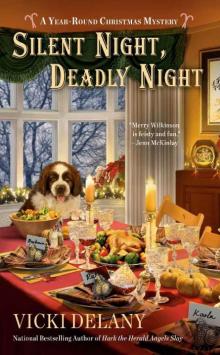 Silent Night, Deadly Night
Silent Night, Deadly Night Coral Reef Views
Coral Reef Views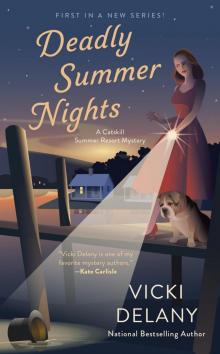 Deadly Summer Nights
Deadly Summer Nights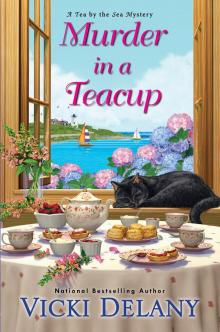 Murder in a Teacup
Murder in a Teacup Whiteout
Whiteout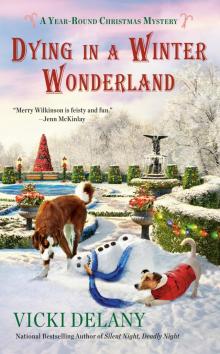 Dying in a Winter Wonderland
Dying in a Winter Wonderland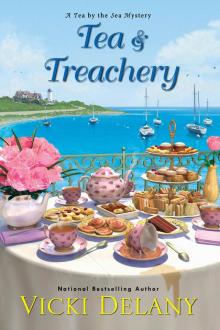 Tea & Treachery
Tea & Treachery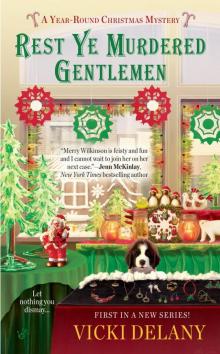 Rest Ye Murdered Gentlemen
Rest Ye Murdered Gentlemen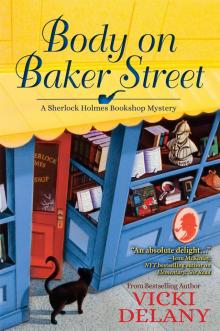 Body on Baker Street: A Sherlock Holmes Bookshop Mystery
Body on Baker Street: A Sherlock Holmes Bookshop Mystery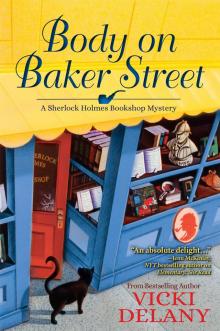 Body on Baker Street
Body on Baker Street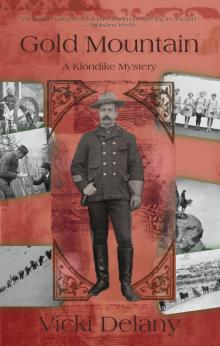 Gold Mountain
Gold Mountain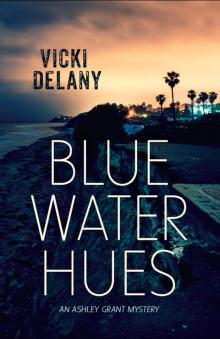 Blue Water Hues
Blue Water Hues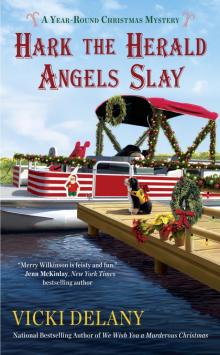 Hark the Herald Angels Slay
Hark the Herald Angels Slay Murder at Lost Dog Lake
Murder at Lost Dog Lake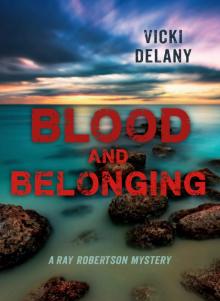 Blood and Belonging
Blood and Belonging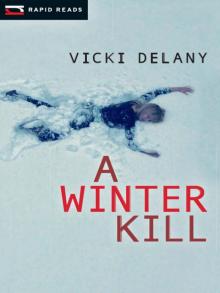 A Winter Kill
A Winter Kill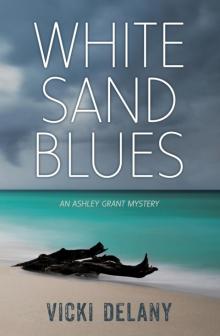 White Sand Blues
White Sand Blues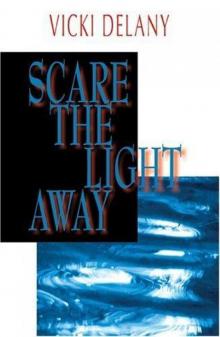 Scare the Light Away
Scare the Light Away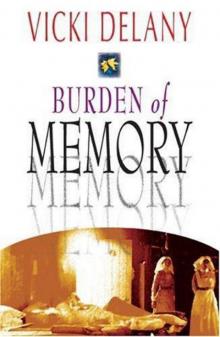 Burden of Memory
Burden of Memory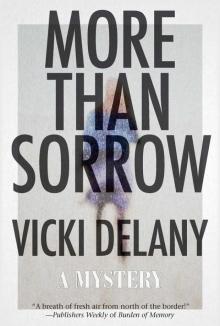 More Than Sorrow
More Than Sorrow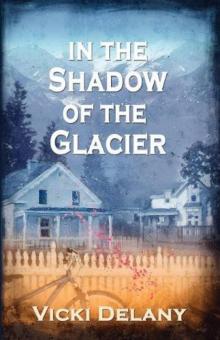 In the Shadow of the Glacier
In the Shadow of the Glacier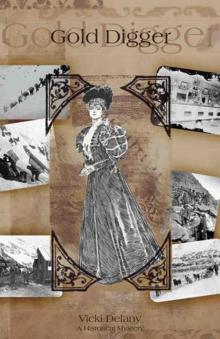 Gold Digger: A Klondike Mystery
Gold Digger: A Klondike Mystery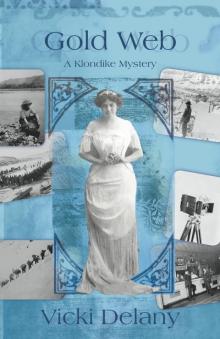 Gold Web
Gold Web Haitian Graves
Haitian Graves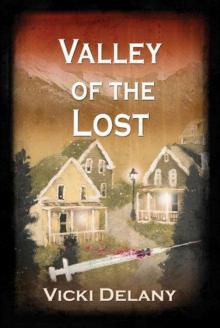 Valley of the Lost
Valley of the Lost We Wish You a Murderous Christmas
We Wish You a Murderous Christmas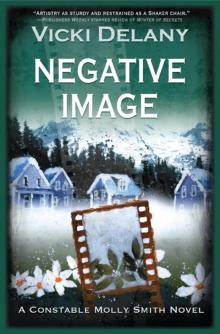 Negative Image
Negative Image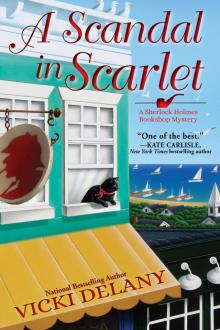 A Scandal in Scarlet
A Scandal in Scarlet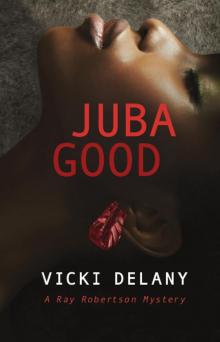 Juba Good
Juba Good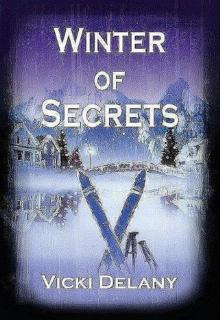 Winter of Secrets
Winter of Secrets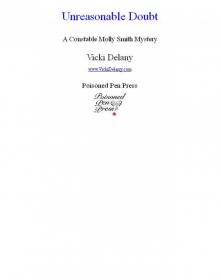 Unreasonable Doubt
Unreasonable Doubt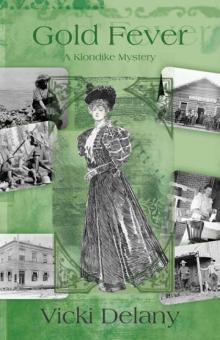 Gold Fever
Gold Fever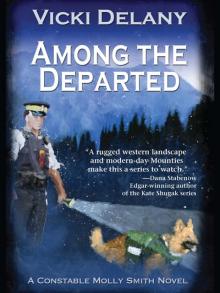 Among the Departed
Among the Departed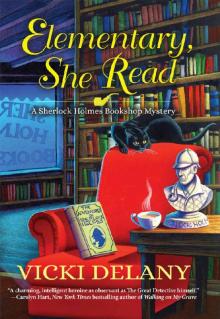 Elementary, She Read: A Sherlock Holmes Bookshop Mystery
Elementary, She Read: A Sherlock Holmes Bookshop Mystery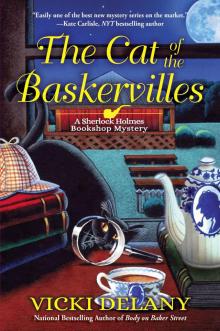 The Cat of the Baskervilles
The Cat of the Baskervilles